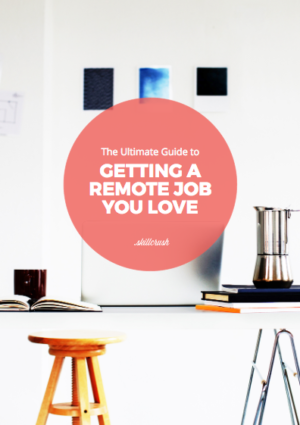
Get Our FREE Guide to Landing a Remote Job You Love
Say goodbye to the 9-to-5. Learn the steps you can take TODAY to get a remote job.
There’s plenty of reasons not to make a career change I hear over and over again from people who say they aspire to do something new but don’t follow through to make this happen. You probably know the popular excuses—I don’t know where to start, I can’t afford the pay cut, it’s too late, I don’t have enough time, it won’t work out anyway—that doom people before they even try.
However, there are even more excuses that pop up beyond the usual suspects. Are you guilty of any of these?
1. It’s too soon to make a change.
Sure, there are wannabe career changers who fear it’s too late to make a change. The flip side is that some people fear it’s too soon! You fear you haven’t given a gallant enough effort at that current job you hate. You fear that you will be perceived as uncommitted if you leave your job. You feel guilty about quitting. You fear that you don’t have enough experience to build on.
Turn this fear on its head, and be grateful that you quickly identified you’re unhappy at your job. Rather than see this as lack of commitment, commit to your career change and finding a career path you actually care about—so you can live a more fulfilled life. Instead of lamenting you don’t have enough experience, be glad that you didn’t invest too much time and effort into a field you no longer want.
2. My family, friends and/or significant other won’t let me.
People who care may seem unsupportive because they are worried about your prospects—this isn’t misguided as career change takes work. Loved ones may fear that changing your mind about career could lead to changing your mind about them. Or maybe they’re jealous that you’re taking action on something they thought of, too, but never did.
Whatever the reason you aren’t getting support from family, friends, partner, etc., it probably seems reasonable to them, and it probably isn’t for lack of caring about you. It’s better for your career change anyway to be leaning on people in your new field—they know how things get done and can give you better advice. They are doing what you want to do so can give you inspiration. They are active in the field and can more realistically help you. Focus on your new network, not convincing your old one.
3. My resume won’t let me.
Like waiting for your family and friends to get on board, too many aspiring career changers hope their resume can be massaged or refined enough to support their new field. But a resume is a backward-looking document, so when you put all your experience on it and it sounds like your old career, which of course it will, you get discouraged, and you give up on your career change because your resume just isn’t competitive for your new career.
Your resume is not what is keeping you from a career change. A resume is but one step in a job search, a resume is only one marketing tool of many. Your resume won’t sell you properly for your future career because it’s about what you did in the past. There are other more powerful steps to take than sending out a resume.
4. I don’t want to go back to school.
Just like you shouldn’t assume you need to take a pay cut to change careers, don’t assume you need to go back to school either. Graduate school, certifications, classes and conferences are all useful for a career change but not prerequisites. Whether or not to go to grad school is separate from whether or not you want to change careers.
5. I have invested too much in my current career already.
With people living longer, careers are invariably longer. You could spend decades in one career and still have decades to go. Those initial years are not wasted—you developed skills, gained experience, built a network, and hopefully had fun along the way. However, if the prospect of more years in your current career doesn’t excite you, then look at what else you can do. You can always find ways to leverage what you already invested in your previous career in a new career. At the very least, your first career gives you perspective on what you don’t want going forward.
A version of this post originally appeared on Ellevate Network.
Caroline Ceniza-Levine is a career change expert and author of Jump Ship: 10 Steps To Starting A New Career. Her latest career change is running CostaRicaFIRE.com.

Get Our FREE Guide to Landing a Remote Job You Love
Say goodbye to the 9-to-5. Learn the steps you can take TODAY to get a remote job.

